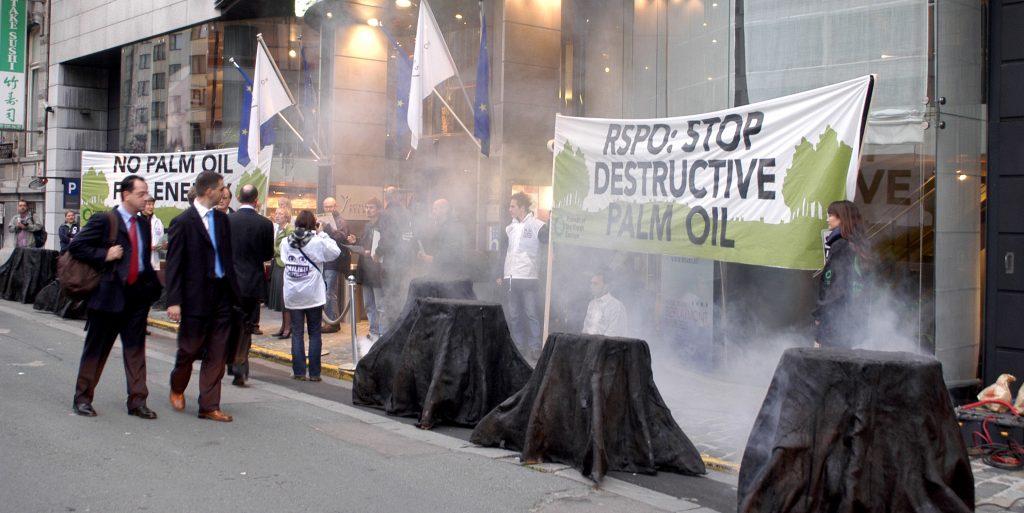Amsterdam/Brussels, 15 March – One of the leading suppliers of “green” palm oil to Europe is causing illegal encroachment upon Indonesian forest and peat land, according to a report published today by Friends of the Earth Europe. The report exposes the illegal activities of the Malaysian showcase company IOI Group and shows that the increasing demand in Europe for palm oil in food and biofuels is leading to deforestation, breaches of environmental law and land conflicts in Asia. [1]
The revelations come as the European Commission re-considers its attempt to redefine palm oil plantations as “forests” in their draft guidance to EU countries aiming to prevent unsustainable biofuels [2], and discussions surrounding the use of industry-led certification schemes to meet EU standards continue.
Adrian Bebb, food and agriculture campaign coordinator for Friends of the Earth Europe said: “Illegal deforestation, land-grabbing and the breach of environmental laws are the reality behind Europe’s palm oil use. Europe’s biofuel target and palm-oil obsession are driving this destruction, and companies like the IOI Group, that promote themselves as green and responsible, are putting profit before both people and the planet, sacrificing forests for Europe’s food and fuel.”
According to the United Nations the rapid increase in palm oil plantation acreage is now the primary cause of permanent rainforest loss in Indonesia. [3]
The Friends of the Earth investigation exposes the actions of the Malaysian-based IOI Group, the largest palm oil company in the world and one of the driving forces behind ‘green’ certification schemes for palm oil. The research reveals that IOI is responsible for illegal deforestation, the encroachment upon protected peat lands, and land-grabbing at the expense of local rice farmers in the Indonesian province of West Kalimantan. [4]
IOI Group is a leading member of the Malaysian Palm Oil Council (MPOC), one of the most active lobby groups pushing for palm oil to be used as a biofuel in the EU, and co-founder of the Roundtable for Sustainable Palm Oil (RSPO). The majority of palm oil comes to Europe via the Netherlands where IOI operate a number of facilities. The food-multinational Unilever and the Finnish biofuel producer Neste Oil are among the buyers of IOI’s palm oil.
Adrian Bebb, food and agriculture campaign coordinator for Friends of the Earth Europe said:“By attempting to redefine industrial palm oil plantations as forests, forests will become fair game for conversion into damaging biofuel plantations. The resulting green house gas emissions from deforestation mean that EU biofuel targets end up fuelling climate change rather than curbing it. All efforts should be made to prevent the use of palm oil in biofuels.”
***
NOTES:
[1] The report Too Green to be True – can be found here [2] Read the related press release hereThe draft EC communication is available xxxx.
The relevant article reads:
4.2.1. Continuously forested areas:
“Continuously forested areas are defined as areas where trees have reached, or can reach, at least heights of 5 meters, making up a crown cover of more than 30%. They would normally include forest, forest plantations and other tree plantations such as palm oil. Short rotation coppice may qualify if it fulfils the height and canopy cover criteria.
“This means, for example, that a change from forest to oil palm plantation would not per se constitute a breach of the criterion. A change form short rotation coppice to annual agricultural crops could constitute a breach of the criterion.”
[3] ] The last stand of the orangutan, United Nations Environment program, 2007 [4] IOI Group claims to follow strict voluntarily sustainability guidelines. They claim to strictly avoid encroaching on peat- and forested land or developing new plantations that result in deforestation. IOI Group also states that it operates according to regulatory requirements in the countries where they operate, and is considered a showcase example by Neste Oil as a supplier of ‘responsible’ palm oil for its new biodiesel installations in Rotterdam and Singapore.






